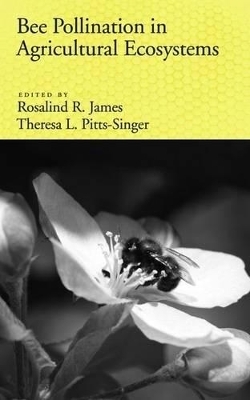
Bee Pollination in Agricultural Eco-systems
Oxford University Press Inc (Verlag)
978-0-19-531695-7 (ISBN)
Rosalind R. James is Research Leader of the USDA Agricultural Research Services Pollinating Insect Biology, Systematics, and Management Research Unit in Logan, Utah. Theresa L. Pitts-Singer is a Research Entomologist in the USDA Agricultural Research Services Bee Biology and Systematics Laboratory in Logan, Utah.
Foreword by Chris OToole ; SECTION 1: BEES AS POLLINATORS AND MORE IN AGRICULTURAL ECOSYSTEMS ; Chapter 1 - Introduction: Bees in Nature and on the Farm (Theresa L. Pitts-Singer and Rosalind R. James) ; Chapter 2 - Crop Pollination Services from Wild Bees (Claire Kremen) ; Chapter 3 - Crop Pollination in Greenhouses (Jose M. Guerra-Sanz) ; Chapter 4 - Pollinating-Bees Crucial to Farming Wildflower Seed for U.S. Habitat Restoration (James H. Cane) ; Chapter 5 - Honey Bees, Bumble Bees, and Biocontrol: New Alliances Between Old Friends (Peter G. Kevan, Jean-Pierre Kapongo, Mohammad Al-mazraawi, and Les Shipp) ; SECTION 2: MANAGING SOLITARY BEES ; Chapter 6 - Ecophysiology of the Life Cycle in Osmia Mason Bees Used as Crop Pollinators (Jordi Bosch, Fabio Sgolastra, William P. Kemp) ; Chapter 7 - Past and Present Management of Alfalfa Bees (Theresa L. Pitts-Singer) ; Chapter 8 - The Problem of Disease When Domesticating Bees (Rosalind R. James) ; SECTION 3: ENVIRONMENTAL RISKS ASSOCIATED WITH BEES ; Chapter 9 - Environmental Impact of Exotic Bees Introduced for Crop Pollination (Carlos H. Vergara) ; Chapter 10 - Invasive Exotic Plant-Bee Interactions (Karen Goodell) ; Chapter 11 - Estimating the Potential for Bee-Mediated Gene Flow in Genetically-Modified (GM) Crops (James E. Cresswell) ; Chapter 12 - Genetically Modified Crops: Effects on Bees and Pollination (Lora A. Morandin) ; Chapter 13 - The Future of Agricultural Pollination (Rosalind James and Theresa Pitts-Singer)
| Erscheint lt. Verlag | 28.8.2008 |
|---|---|
| Zusatzinfo | 14 halftones, 11 line illustrations |
| Verlagsort | New York |
| Sprache | englisch |
| Maße | 236 x 157 mm |
| Gewicht | 454 g |
| Themenwelt | Naturwissenschaften ► Biologie ► Botanik |
| Naturwissenschaften ► Biologie ► Evolution | |
| Naturwissenschaften ► Biologie ► Zoologie | |
| ISBN-10 | 0-19-531695-9 / 0195316959 |
| ISBN-13 | 978-0-19-531695-7 / 9780195316957 |
| Zustand | Neuware |
| Haben Sie eine Frage zum Produkt? |
aus dem Bereich


